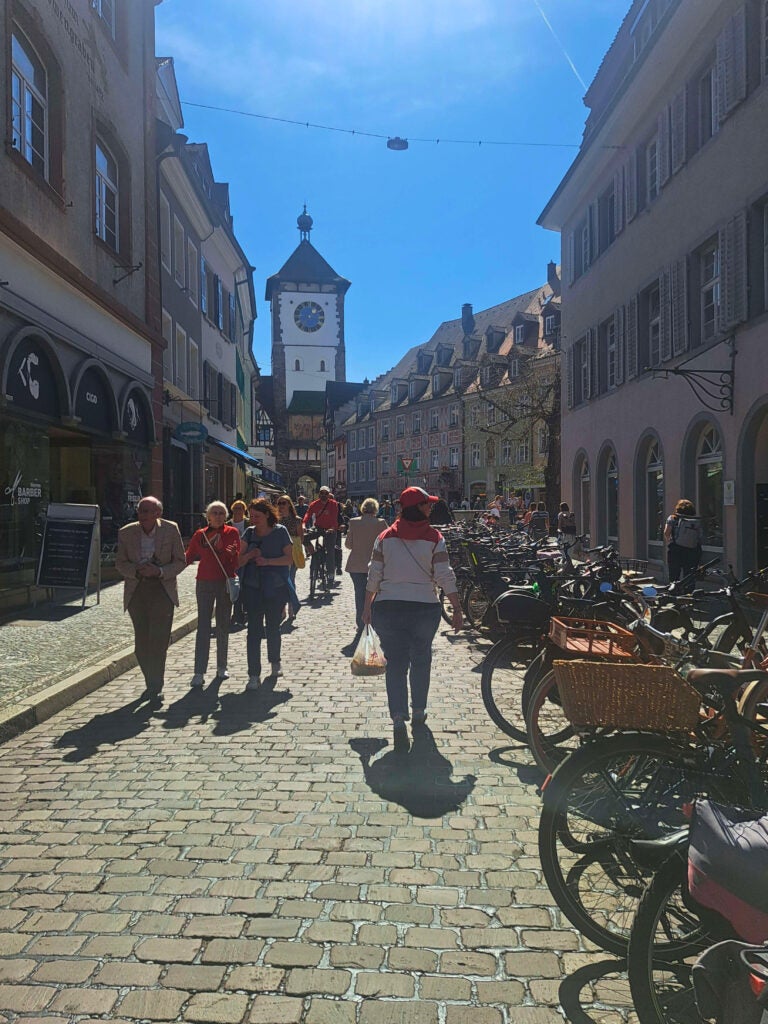Arriving in Freiburg
Nine hours after leaving the United States, I touched down at Frankfurt Airport early on a Monday morning. From there, I hopped on a two-hour train down south to Freiburg, the small city nestled in the Black Forest that I’d be calling home for the upcoming months.

Deliriously exhausted from a lack of sleep and hauling around multiple bags, I kept having the same thought the entire train ride: “Wow, I’m finally in Germany.”
Watching the German countryside flashing by through a small window on the train was surreal. After finding a seat on the crowded train, I took a moment to appreciate the years of work that had led to this moment.
Learning German: An On-and-Off Relationship
I had always wanted to study abroad long before I started college. The idea of jumping headfirst into another country and culture for an extended period fascinated me. However, learning German and choosing to study abroad in Germany was a long and bumpy journey.
I began studying German in 10th grade. However, the COVID-19 pandemic interrupted my studies. I wasn’t prepared for the AP German test and didn’t get the credit I needed to take an advanced German course at The University of Texas at Austin.
Determined to keep progressing, I tried to test into the next level of German at UT during my freshman orientation, missing only a few points. Rather than giving up on Germany entirely, I decided to prove I could learn the language. I enrolled in an entry level German course, promising myself that I could learn enough German to survive an immersive study abroad experience in Germany.
Five semesters and 22 credit hours later, I was accepted into a study abroad program in Freiburg!
The Real Test
When I visited Germany a couple of years ago, my German was not up to par. This time around, I was nervous that I would struggle again with using my German in daily conversations.

Many Germans are proficient in English, often switching to English if they sense that you don’t speak fluent German. As with any adjustment period, I naturally made a couple of mistakes along the way. But I was able to navigate the city pretty well.
Ordering from restaurants always went smoothly, and I even managed to open a German bank account in a country with an infamously tedious bureaucracy.
When registering for courses, I decided to put my language skills to the test. In addition to an English language class and German language classes designed for non-native speakers, I enrolled myself in Einführung in die Religionsanthropologie (Introduction to Religious Anthropology), an anthropology course taught entirely in German for German students.
The Moment of Truth
I was nervous when I headed into class on my first day at Albert Ludwigs University of Freiburg. I had no idea whether my German would be sufficient for navigating such an advanced academic environment. I was worried that my classmates would think I was stupid or switch to English if I made any mistakes.
Many fears swirled through my head as I prepared to step into my anthropology class for the first time. I had already attended my German-language courses taught for non-native speakers which went well, but I knew my anthropology course would challenge me on another level.

Class began smoothly. When the professor walked us through the course objectives and procedures, I found myself comprehending most of what she said. Naturally, there were certain words and phrases I didn’t quite understand. Though I had to be laser-focused to pick up everything, I was doing well.
Then we had a participation activity. The professor handed us various definitions of religion and made us discuss our definition with a classmate who received a different definition. My anxiety flared up, While it’s one thing to sit back in a lecture hall and listen to a professor, it’s another to discuss the material with classmates.
Despite my concerns, I managed to complete the activity comfortably. After discussing our definitions and exchanging names with a girl in my class, she asked me which semester I was in. I told her that I was doing an exchange semester. When I told her that I was from the U.S., she exclaimed in shock, “Aber du spricht Deutsch wirklich gut!” This phrase translates to “But you speak German very well!”
Since then, I’ve taken her compliment to heart. It’s an indicator that that my language skills are advanced enough for me to survive – and thrive – in an environment which requires fluency in German. Though the semester has only just begun and there’s still quite a while to go, that first day in class was a major success in my eyes.
The obstacles I encountered to get to this point now seem far away. With hard work and dedication, I’m closer than ever to accomplishing my goal of navigating life in Germany with the German language.
This post was contributed by Dantes Martinez, a Global Ambassador for Spring 2025. Dantes is a senior studying abroad in Freiburg, Germany.





